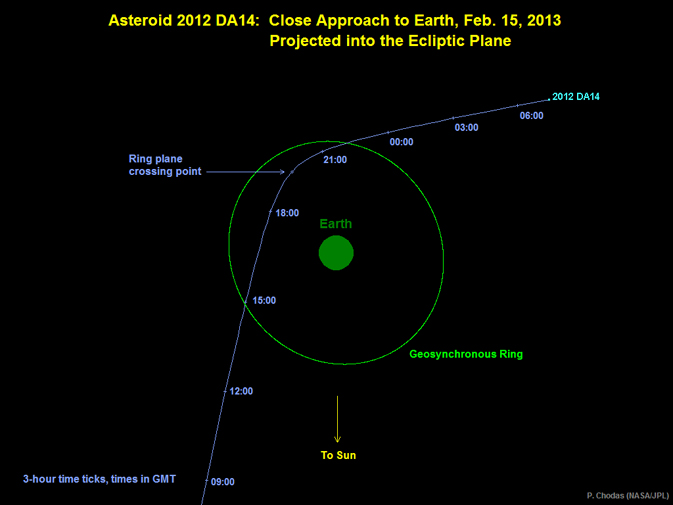Not to worry anyone, but tomorrow, an asteroid is headed our way. According to astronomers, there is no danger of it hitting the planet, but it will actually end up being closer to us than any asteroid ever observed. NASA estimates that at about 2:24 EST, Asteroid 2012 DA14, as it has been named, will be only about 17,200 miles from the Earth. It sounds like at lot, but to give you an idea of how close that is, satellites that are in geosynchronous orbit are 22,245 miles above the planet. So this 150-foot diameter space rock will come even closer than that while traveling at speed of about five miles per second. (Thankfully, no other satellites are in its path since they orbit much closer to Earth — the International Space Station, for example, orbits at an altitude of 240 miles.
)
According to NASA, however, little DA14 could have made quite an impact if it made a direct hit:
Asteroid 2012 DA14 will not impact Earth, but if another asteroid of a size similar to that of 2012 DA14 were to impact Earth, it would release approximately 2.5 megatons of energy in the atmosphere and would be expected to cause regional devastation.
buy xifaxan generic xifaxan without prescription online
A comparison to the impact potential of an asteroid the size of 2012 DA14 could be made to the impact of a near-Earth object that occurred in 1908 in Tuguska, Siberia. Known in the asteroid community as the “Tunguska Event,” this impact of an asteroid just slightly smaller than 2012 DA14 (approximately 100 – 130 feet) is believed to have flattened about 825 square miles of forest in and around the Podkamennaya Tunguska River in what is now Krasnoyarsk Krai, Russia.
Evidently this sort of thing is not unheard of.
Scientists at NASA’s Near-Earth Object Program Office estimate that an asteroid the size of 2012 DA14 flies this close every 40 years on average and that one will impact Earth, on average, about once in every 1,200 years.
buy zithromax generic zithromax without prescription online
But this time, we’re safe. Not even cell phones will be affected. So scientists will have a ball and we can breathe easy.
No need to alert Bruce Willis.
And if you want to check out the asteroid as it goes by, there are quite a few sites that are providing live streaming of the event. Go science.

